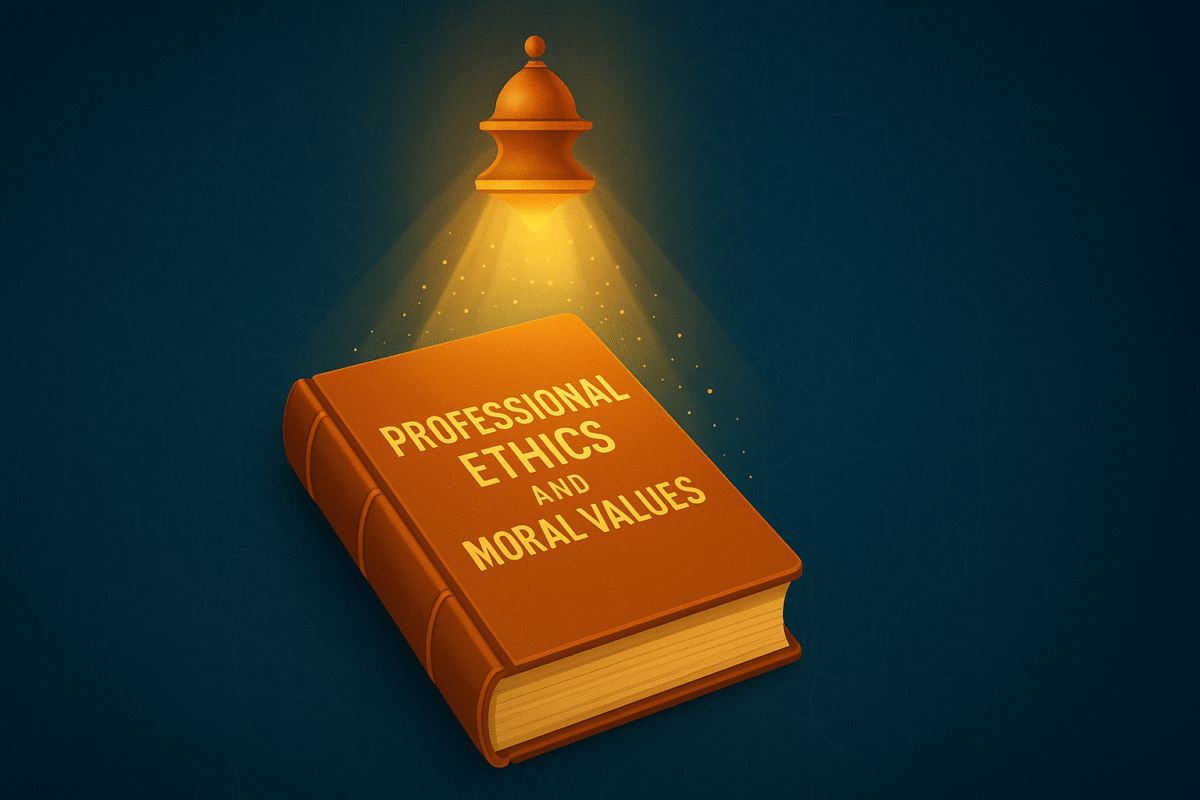Professional ethics and moral values have a very special place in Islamic teachings. They not only make an individual’s personal life beautiful and meaningful, but also promote discipline, honesty, and justice in social life. These principles hidden in the depths of Islamic studies make us understand that it is our responsibility to adopt ethical principles in every profession and work. The study of professional ethics and moral values is a means of understanding and practicing the scope of Islam in every sphere of life.
Relationship to Life
Have you ever thought about the importance of ethics in your daily work?
Have you ever realized how a small wrong decision can change your professional life? How often in our daily work do we come across situations where we are tested to what extent we are able to follow professional ethics and moral values? Whether it is honesty in the workplace, protecting one’s rights, or caring for the rights of others, all of these things are in line with our Islamic teachings. When we adopt professional ethics and moral values in our daily lives, not only does our personality improve, but society also improves. But are we really making these moral principles a part of our lives?
Quran, Hadith, and Examples of the Elders
A Wise Incident That Shows the Importance of Professional Ethics and Moral Values
Once Hazrat Ali (RA) advised a person to be extremely honest in his business dealings. He said, “Whoever is honest in his work, Allah will honor him in this world and the Hereafter.” There is a famous incident where a businessman tried to lose weight to increase his profits, but he was strictly forbidden and said, “Honesty is the foundation of professional ethics.” This teaches us how important professional ethics and moral values have been considered in Islamic studies. These ethical principles teach us that it is essential to adopt honesty, justice, and goodness in every aspect of life. You can also read Human Rights and Fundamental Rights
Similarly, another incident is well-known that Hazrat Maulana Ashraf Ali Thanvi (may Allah have mercy on him) always emphasized to his students and the general public that religious knowledge alone is not enough in professional life, but moral training and character building are also essential. He said that
“The purpose of knowledge is not just to study books, but to improve morals and improve actions through this knowledge.”
He used to advise his students to work with honesty, justice, fairness, and sincerity in professional life. A major aspect of Hazrat Maulana Ashraf Ali Thanvi’s reform efforts was that he gave great importance to ethics and professional values in practical life, and explained that both of these are the soul of Islam.

Easy Ways to Adopt
7 Easy Ways to Adopt Professional Ethics and Moral Values
- Make honesty the principle of your life
According to Islamic teachings, honesty is not only a desirable trait but also the key to success. - Take care of the rights of others along with your rights.
It is a basic part of professional ethics that we protect the rights of others. - Do not let go of justice in every work.k
Justice has been emphasized a lot in the Quran and Hadith, and it is the soul of professional ethics. - Prioritize service to the people.e
In Islam, service to the people has the status of worship, which reflects moral values. - Avoid cheating
Cheating is against professional ethics, and Islamic sciences strictly prohibit it. - Be patient and forbearing.
Patience and forbearance are required in professional life, which is part of moral values. - Always keep your intentions pure.
Purity of intention in every work is the main pillar of Islamic ethics.
Attractive Summary
Professional Ethics and Moral Values: The Bright Lamp of Life
The study of professional ethics and moral values is a part of Islamic sciences that not only makes our daily work acceptable to Allah but also strengthens and balances our character. When we adopt honesty, justice, and service to humanity in our profession according to Islamic teachings, our society also improves, and Allah’s pleasure is obtained. Therefore, we should make professional ethics and moral values an integral part of our lives so that we can succeed in both this world and the hereafter. You can also read The Importance of Hajj in Islam.
Comprehensive Prayer
Prayer for Ethics
O Allah, grant us the light of honesty and justice in our profession, and make our ethics by Your pleasure.
Conclusion
Professional ethics and moral values in Islamic teachings go far beyond theory—they are essential practices for success in both worldly life and the hereafter. These values create balance, trust, and compassion in society. The real beauty of Islamic ethics lies in the way they combine inner purity with outward conduct. As professionals in any field, we carry the responsibility to live these values through truthfulness, justice, and service. When we commit to these ethics with sincerity, we not only fulfill a religious duty but also contribute to a more honest and fair society.
FAQs
Can professional success be achieved through Islamic moral values?
Yes, many Islamic scholars and companions have shown that applying honesty, patience, and justice leads to long-term success and Allah’s blessings.
Why is intention (niyyat) so important in professional ethics?
According to Islamic teachings, the reward of every deed depends on intention. Pure intentions ensure sincerity and help maintain ethical conduct even in difficult situations.
How does Islam view cheating in business or work?
Cheating is strictly forbidden in Islam. It damages trust and violates the rights of others, which goes against the core of Islamic ethics.

